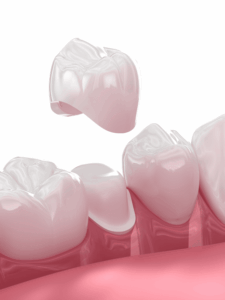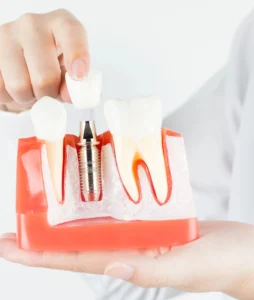For millions dealing with tooth loss, the daily challenge of eating is commonly frustrating or even painful. The simple pleasure of enjoying a crunchy apple or a juicy steak may sadly become a distant memory.
This is one of the biggest reasons so many people are now turning to modern tooth replacement solutions. Among these, dental implants in West Hills remain the gold standard, not just for cosmetic purposes, but also because they restore the ability to eat comfortably again.
The journey from surgery to full recovery requires a bit of planning and patience. Read on as we explain the safe food choices at every stage of the recovery process and how proper dental implant care can impact your diet in the long run.
The First 24–48 Hours After Implant Surgery
The immediate aftermath of dental implant surgery is the most critical phase for healing. The implant site needs time to settle without any disturbance, undue pressure, or irritation.
During the first one to two days, your diet should consist of only cool, soft foods. The cool factor aspect is important to help soothe the area and minimize swelling.
Think of this as a liquid and soft food diet; you should avoid anything that requires chewing. Excellent choices for this initial period include:
- Yogurt and Applesauce
- Smoothies and Protein Shakes (Use a spoon, not a straw, as the suction can dislodge the blood clot and lead to a complication known as “dry socket”)
- Mashed Potatoes and Pudding
- Cold Soups
In this phase, it’s just as important to know what to avoid. Steer clear of hot, spicy, or acidic foods, as they can irritate the delicate healing tissues. Also, avoid anything with small seeds, such as strawberries or berries, which could become lodged in the surgical site.
The First Week: Healing Friendly Foods
As you move past the initial 48 hour window, you can gradually expand your dietary horizons, but the focus remains on soft, healing friendly foods. Your body requires proper nutrition to repair itself, and protein is a crucial component of this process.
You can now introduce a wider variety of foods, all of which should still be easy to chew and swallow; recommendations include:
- Scrambled Eggs
- Oatmeal and Cream of Wheat
- Pasta
- Soft Fish
- Cottage Cheese and Tofu
- Blended Soups
During this period, you still must avoid anything crunchy, hard, sticky, or chewy. That means no popcorn, hard bread, bagels, nuts, or tough meats. A simple rule of thumb: if it makes a crunching sound, don’t eat it.
Weeks 2–6: Gradual Transition
By the second week, your implant site is likely looking and feeling much better. The initial swelling and soreness have subsided, and you can begin to add more texture to your diet.
This stage is all about a controlled reintroduction of solid foods. Focus on cutting food into small, manageable pieces and chewing very gently.
Go for soft fruits like bananas, peaches, and avocados, and cooked vegetables that are soft enough to chew without straining the implant. Slow cooked beef, chicken, or pork that can be shredded are great protein options.
Remember to avoid biting directly on the implant site until your implant dentist gives you the go ahead. Use the opposite side of your mouth for chewing to avoid any direct pressure on the new implant.
Long Term: Eating With Fully Healed Implants
After the osseointegration process is complete (a period of 3 to 6 months where the implant fuses with your jawbone), you’ll be able to eat virtually anything you could before. The restored chewing strength and stability will allow you to enjoy all your favorite foods again.
You can finally bite into a crisp apple, savor a crunchy piece of bread, or enjoy a steak without worrying about your teeth.
What foods can you eat with dental implants? The answer is simple: almost all of them. Fully healed implants function just like natural teeth, providing the same level of comfort and strength.
However, even with fully healed implants, moderation is still key for very hard foods. Just as you wouldn’t constantly bite down on ice with your natural teeth, it’s wise to be gentle with your implants as well.
Foods to Approach With Caution:
- Very Hard Foods: Hard candy, ice, unpopped popcorn kernels, etc. put excessive strain on dental implants and even your natural teeth, which can cause chipping or fractures.
- Sticky Foods: Foods like caramel, taffy, or gummy candies can get stuck and may require considerable force to remove.
- Extremely Tough Meats or Crunchy Foods: While you can enjoy steak, avoid very tough cuts or jerky that require aggressive chewing, and be careful with extremely crunchy foods like pretzels or crusty bread.
- Excessively Acidic or Sugary Foods: These can damage the gums and surrounding natural teeth. While implants are resistant to decay, the tissues supporting them are not.
How to Care for Dental Implants While Eating
Eating with dental implants is not just about what you eat, but also how you eat and how you maintain oral hygiene. Here’s how you can care for your dental plants while chowing down:
Chew Slowly and Evenly
Try to distribute the chewing load evenly across both sides of your mouth to prevent uneven wear and tear and protect your implants.
Proper Oral Hygiene
Just like natural teeth, implants require diligent care, including brushing at least twice a day, flossing around the implant (your dentist for dental implant recovery may recommend special floss or brushes), and using a non alcoholic mouthwash.
Stay Hydrated
Drinking plenty of water helps to wash away food particles and keeps your oral tissues healthy. Avoid dehydration by keeping a bottle of water with you and eating plenty of fruits and vegetables like pineapple and cucumber.
Visit Your Dentist Regularly
Regular checkups with your implant dentist in West Hills are part of the process. Your dentist will monitor the health of your implants, make any necessary adjustments, and provide professional cleaning to remove plaque or tartar buildup.
How Implants Improve Long Term Nutrition
With dental implants, you can easily consume a wider variety of foods, which directly improves your long term nutrition. For one, you can reintroduce fiber rich fruits and vegetables, essential for digestive health.
Properly chewing protein also supports better digestion and nutrient absorption. Due to its dietary impact, dental implant care extends far beyond the mouth, affecting your systemic health in a significant way.
When to Contact Your Dentist
While a slight discomfort in the early stages is normal, it’s important to know when to seek professional help. The following can be signs of a complication, so you should contact your dentist for dental implant recovery if you experience:
- Persistent discomfort while eating after the initial healing phase has passed.
- Significant pain, swelling, or redness around an implant that does not improve.
- A feeling that an implant is loose or mobile.
- Difficulty chewing doesn’t improve over time.
Expert Dental Implant Care in West Hills
By following the above guidelines for safe eating during your recovery and committing to proper long term dental implant care, you can look forward to years of enjoying all your favorite foods.
If you’re ready to restore your diet and your smile, request an appointment with Dr. Salekian, our expert implant dentist at West Hills Smiles, to begin your journey to a healthier, happier you.




